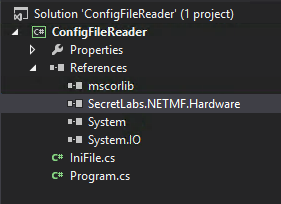sing System;
using System.Net;
using System.Net.Sockets;
using System.Threading;
using Microsoft.SPOT;
using Microsoft.SPOT.Hardware;
using SecretLabs.NETMF.Hardware;
using SecretLabs.NETMF.Hardware.Netduino;
using SecretLabs.NETMF.IO;
using System.IO;
using System.Collections;
namespace NetduinoApplication9
{
public class Program
{
public static void Main()
{
}
}
public class CIni
{
public CIni()
{
_Sections = new Hashtable();
}
/// <summary>
/// Loads the Reads the data in the ini file into the IniFile object
/// </summary>
/// <param name="filename"></param>
public void Load(string FileName, bool append)
{
if (!append)
DeleteSections();
string Section = "";
string[] keyvaluepair;
FileStream inFileStream = new FileStream(Path.Combine("\\SD", FileName), FileMode.Open);
{
using (StreamReader inStreamReader = new StreamReader(inFileStream))
{
string[] lines = inStreamReader.ReadToEnd().ToLower().Split(new char[] { '\n', '\r' });
foreach (string line in lines)
{
if (line == string.Empty)
continue;
if (';' == line[0])
continue;
if ('[' == line[0] && ']' == line[line.Length - 1])
Section = line.Substring(1, line.Length - 2);
else if (-1 != line.IndexOf("="))
{
keyvaluepair = line.Split(new char[] { '=' });
SetValue(Section, keyvaluepair[0], keyvaluepair[1]);
}
}
inStreamReader.Close();
inFileStream.Close();
}
}
}
/// <summary>
/// Used to save the data back to the file or your choice
/// </summary>
/// <param name="FileName"></param>
public void Save(string FileName)
{
using (FileStream outFileStream = new FileStream(Path.Combine("\\SD", FileName), FileMode.Create))
{
using (StreamWriter outStreamWriter = new StreamWriter(outFileStream))
{
foreach (object Sections in _Sections.Keys)
{
outStreamWriter.WriteLine("[" + Sections.ToString() + "]");
Hashtable keyvalpair = (Hashtable)_Sections[Sections];
foreach (object key in keyvalpair.Keys)
outStreamWriter.WriteLine(key.ToString() + "=" + keyvalpair[key].ToString());
}
outStreamWriter.Close();
outFileStream.Close();
}
}
}
public string GetValue(string Section, string key, string defkey = "")
{
key = key.ToLower();
Section = Section.ToLower();
Hashtable keyvalpair = (Hashtable)_Sections[Section];
if ((null != keyvalpair) && (keyvalpair.Contains(key)))
defkey = keyvalpair[key].ToString();
return defkey;
}
public float GetValue(string Section, string key, float defkey)
{
try { defkey = (float)double.Parse(GetValue(Section, key, defkey.ToString())); }
catch (Exception) { }
return defkey;
}
public double GetValue(string Section, string key, double defkey)
{
try { defkey = double.Parse(GetValue(Section, key, defkey.ToString())); }
catch (Exception) { }
return defkey;
}
public UInt64 GetValue(string Section, string key, UInt64 defkey)
{
try { defkey = UInt64.Parse(GetValue(Section, key, defkey.ToString())); }
catch (Exception) { }
return defkey;
}
public UInt32 GetValue(string Section, string key, UInt32 defkey)
{
try { defkey = UInt32.Parse(GetValue(Section, key, defkey.ToString())); }
catch (Exception) { }
return defkey;
}
public UInt16 GetValue(string Section, string key, UInt16 defkey)
{
try { defkey = UInt16.Parse(GetValue(Section, key, defkey.ToString())); }
catch (Exception) { }
return defkey;
}
public byte GetValue(string Section, string key, byte defkey)
{
try { defkey = byte.Parse(GetValue(Section, key, defkey.ToString())); }
catch (Exception) { }
return defkey;
}
public Int64 GetValue(string Section, string key, Int64 defkey)
{
try { defkey = Int64.Parse(GetValue(Section, key, defkey.ToString())); }
catch (Exception) { }
return defkey;
}
public Int32 GetValue(string Section, string key, Int32 defkey)
{
try { defkey = Int32.Parse(GetValue(Section, key, defkey.ToString())); }
catch (Exception) { }
return defkey;
}
public Int16 GetValue(string Section, string key, Int16 defkey)
{
try { defkey = Int16.Parse(GetValue(Section, key, defkey.ToString())); }
catch (Exception) { }
return defkey;
}
public void SetValue(string Section, string key, string value)
{
key = key.ToLower();
Section = Section.ToLower();
if (!_Sections.Contains(Section))
_Sections.Add(Section, new Hashtable());
Hashtable keyvalpair = (Hashtable)_Sections[Section];
if (keyvalpair.Contains(key))
keyvalpair[key] = value;
else
keyvalpair.Add(key, value);
}
public void SetValue(string Section, string key, float value)
{
SetValue(Section, key, value.ToString());
}
public void SetValue(string Section, string key, double value)
{
SetValue(Section, key, value.ToString());
}
public void SetValue(string Section, string key, byte value)
{
SetValue(Section, key, value.ToString());
}
public void SetValue(string Section, string key, Int16 value)
{
SetValue(Section, key, value.ToString());
}
public void SetValue(string Section, string key, Int32 value)
{
SetValue(Section, key, value.ToString());
}
public void SetValue(string Section, string key, Int64 value)
{
SetValue(Section, key, value.ToString());
}
public void SetValue(string Section, string key, char value)
{
SetValue(Section, key, value.ToString());
}
public void SetValue(string Section, string key, UInt16 value)
{
SetValue(Section, key, value.ToString());
}
public void SetValue(string Section, string key, UInt32 value)
{
SetValue(Section, key, value.ToString());
}
public void SetValue(string Section, string key, UInt64 value)
{
SetValue(Section, key, value.ToString());
}
public void DeleteSection(string Section)
{
Section = Section.ToLower();
if (_Sections.Contains(Section))
_Sections.Remove(Section);
}
public void DeleteSections()
{
_Sections.Clear();
}
private Hashtable _Sections = null;
}
}

